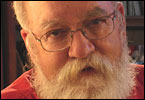Protecting Democracy before Promoting Faith
 Daniel C. Dennett (left) may look like Santa Clause but he's actually the Austin B. Fletcher Professor of Philosophy, and Co-Director of the Center for Cognitive Studies, at Tufts University. He wrote Breaking the Spell. He brings an Atheist's perspective to the Washington Post's regular "On Faith" section. He takes on this question in today's paper:
Daniel C. Dennett (left) may look like Santa Clause but he's actually the Austin B. Fletcher Professor of Philosophy, and Co-Director of the Center for Cognitive Studies, at Tufts University. He wrote Breaking the Spell. He brings an Atheist's perspective to the Washington Post's regular "On Faith" section. He takes on this question in today's paper:
Some politically conservative Christians say that America is "a Christian nation," and at this time of year, with the country saturated with Christmas imagery, it can seem that they are right. Are they? Is America a "Christian nation"? Should it be?His answer is very good. Some excerpts:
[T]he Christian conservatives in the country who wish to declare that this is a Christian nation are becoming bolder and bolder in their willingness to impose their own viewpoint on those who disagree. Fortunately, there are the beginnings of an organized Resistance to this takeover, such as the Interfaith Alliance, chaired by Walter Cronkite. I enthusiastically support this effort, even though I am myself an atheist. Atheism is one of the live rails of American politics-touch it and you're toast. Fair enough. Those are the current facts of life. Not so long ago, you couldn’t be elected if you were Catholic, or Jewish, or African-American. But shouldn't we install another live rail, on the opposite side of the religious spectrum?Dr. Dennet concludes his response with this powerful statement:
It ought to be just as much a fact of life that anybody who declares that their allegiance to their religion comes before their allegiance to democracy is simply unelectable. Fifty years ago President Eisenhower nominated Charles E. Wilson, then president of General Motors, as his Secretary of Defense. At the nomination hearing before the Senate Armed Services Committee, Wilson was asked to sell his shares in General Motors, but he objected. When asked if his continued stake in General Motors mightn't unduly sway his judgment, he replied: "For years, I thought what was good for the country was good for General Motors and vice versa." Some in the press, unsatisfied with this response, stressed only the second half of his response--"What's good for General Motors is good for the country"-and in response to the ensuing furor, Wilson was forced to sell his stock in order to win the nomination.
Substitute "The American Baptist Church" or "The Roman Catholic Church" for "General Motors" and ask yourself whether you want candidates who waffle on this score to lead the nation. Even if it is true, as Wilson opined, that other things being equal, what's good for GM is good for the country, people wanted to know which way he'd lean in the perhaps rare cases where he had to choose between what was good for the country and what was good for his corporation. They wanted him to put General Motors firmly in second place, and we want our politicians to put the welfare of the nation ahead of the welfare of their religion as well. If they won't make a solemn pledge about this, we should worry.
We are currently asking the Shiites and Sunnis of Iraq to put their allegiance to their nation ahead of their allegiance to their religion. We must surely ask ourselves, and especially our political leaders, to make the same solemn commitment.Once more, we see Christian Privilege. Our leaders are prepared to govern by their religion, legislate their beliefs, and mandate their particular morals, rules, and guide lines - yet turn around and demand that non-Christian efforts to do exactly the same thing be abandoned in favor of a secular, unity government.
Dr. Dennet asks a simple question and draws very clear conclusions from a response.
"Do [you] put the welfare of the nation above the welfare of [your] particular religion? If you cannot answer Yes to that question, you should consider that you are not a good American, but a part of the problem: you are taking advantage of American religious freedom without being prepared to pledge your support to the principle that secures it."
Other panelists seem unwilling to draw a hard line about America's status as a 'Christian Nation.'
Some clearly state that they mean to ignore "whether a nation can (or should) be Christian." Instead they outline divides among American Christians and seek to redirect the question into something more like 'What kind of Christians make up America?'
Another panelist simply try to keep everybody happy by declaring that America isn't a 'Christian Nation' but a great nation because there are so many Christians in it.
The question is further avoided by panelists who play with the difference between 'nation' and government and call for a "society in which religiously informed viewpoints are welcomed in the public square on an equal basis with all other voices." One assumes that teaching children in public schools that the world in 6,000 years old, that Dinosaurs and humans roamed the earth together and/or that the world is flat would be some of the 'viewpoints' given equal basis as, say, Science.
Calling for any politician that wouldn't put the Constitution above her or his religious beliefs to be "unelectable" same way that Atheists are now and African Americans used to be (in places still are) shows a great deal of moral courage. It is a call that is both necessary and unpopular.
That's why I'm sure it will be ignored.
Daniel Dennett Christian Nation Christianists






No comments:
Post a Comment